A new report suggests that Zika virus has been sexually transmitted between two people in Texas. If confirmed, this will be the first evidence of the virus being spread through sexual contact in the US, and only the second such case worldwide.
Zika virus is usually transmitted by mosquitoes, but last year a team of medical researchers confirmed that the virus could also be passed on sexually. And now the Dallas County Health and Human Services (DCHHS) suggests the same thing has caused one individual, who hadn't travelled outside the US, to become infected. The individual's partner had recently returned from Venezuela.
"A person who recently traveled to an area with Zika virus transmission returned to the United States and developed Zika-like symptoms," the US Centres for Disease Control and Prevention (CDC) told the media. "The person later tested positive for Zika, along with their sexual partner, who had not traveled to the area."
Researchers still need to confirm exactly how this new case was transmitted, but the evidence suggests that the person who travelled to Venezuela brought back the infection and then spread it to their partner via semen.
"We don't believe this was spread through mosquito bites," Anne Schuchat, principal deputy director of the CDC, told the BBC. "We do believe it was spread through a sexual contact."
Health officials are now cautioning people exposed to the virus to be extra careful.
"Now that we know Zika virus can be transmitted through sex, this increases our awareness campaign in educating the public about protecting themselves and others," said Zachary Thompson, the director of the DCHHS. "Next to abstinence, condoms are the best prevention method against any sexually-transmitted infections."
Regardless of how this case spread, this is the first time we know of that the virus has been transmitted within mainland US - all other cases were caught overseas.
For most people, Zika virus doesn't cause much worse than a week of rash, fever, and conjunctivitis. But in pregnant women, the virus has been linked to a condition called microcephaly, which causes babies to be born with abnormally small skulls and potentially severe brain damage.
To be clear, this link hasn't been confirmed, but the evidence is so strong, and the implications are so serious, the World Health Organisation upgraded the outbreak to a global public health emergency earlier this week - something it's only done on three other occasions. There is currently no vaccine and no treatment for Zika.
The good news in all of this is there's still no evidence of the virus being transmitted by mosquitoes in the US, or anywhere outside these 28 countries and territories. But that list is continuously being updated and added to by the CDC. Today, two cases of Zika were confirmed in Australia, in individuals who had recently returned from the Caribbean.
"Based on what we know now, the best way to avoid Zika virus infection is to prevent mosquito bites AND to avoid exposure to semen from someone who has been exposed to Zika," the CDC told The Guardian.
Expectant mothers are also being advised not to travel to regions with active Zika virus transmission, and in some of the most affected regions, such as Brazil, women are being asked to postpone planned pregnancies if possible. In the central American country of El Salvador, officials have asked females not to get pregnant until 2018.
